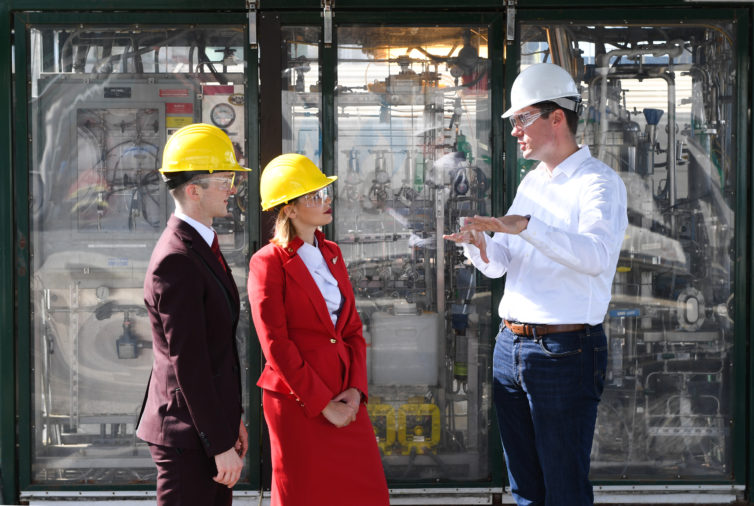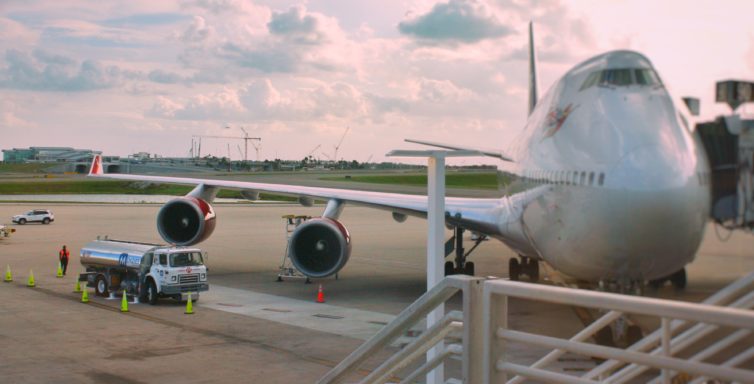
Photo: Doug Peters/PA Wire
It can be hard for the environmentally minded AvGeek to get on a flight without a twinge of guilt, since planes spew tons of carbon dioxide into the atmosphere every minute of every day. Over recent years, the industry has slowly started wising up to the importance of sustainability. We’ve seen some airlines introduce biofuels derived from plant products. But today, the field takes a new leap forward.
The Boeing 747 flying Virgin Atlantic’s flight #16 today from Orlando to London Gatwick will be powered by a unique sustainable jet fuel that’s recycled from carbon-containing waste gases from industries like steel mills. The result is a product that has proven at least as powerful as regular jet fuel but with a significantly lower carbon footprint. The flight is the outcome of a partnership between Virgin Atlantic and LanzaTech, which developed the fuel. Partners like Boeing, Honeywell, GE, fuel suppliers, and the DOE played a significant role as well.

The star of the show. Or stars, if you include the fuel tanker. – Photo: Manu Venkat | AirlineReporter
We’ll be on the inaugural flight and will be back later with a full report. For the time being, check out our Twitter feed for live updates. Here’s to a greener future for aviation!
I sure hope this ”experiment” won”t eventually end up in a senseless tragedy. There is so much ”political science” out there today which only serves to advance the eco crowd in their agenda to eliminate economic and social progress and attack the capitalist system that the western world has used to achieve historic achievements. This non-carbon footprint fuel is full of carbon. It just rearranges where the carbon impacts the Earth. Recycling involves carbon emissions. You can”t get away from it. Transportation itself is involved in recycling and has a negative impact on the Earth. We should have learned our lesson with ethanol. Ethonal is not cracked up at all to what the eco crowd has claimed. Corn requires huge amounts of water which has severely reduced water tables all around the country. It also requires an enormous amount of fertilizer which results in all kinds of emissions when produced at chemical plants, not to mention it”s impact on fields of dirt and the water table below. The energy ethonal has per unit volume is way less than fuel. It negatively impacts a vehicle”s fuel mileage resulting in more frequent fuel stops and in turn results in more fuel trucks on the roads for distribution of fuel. Not only do we have political science in play but we now have a new alternative fuel being used that has not been tested over a long term. Having been both an Air Force pilot and commercial pilot for nearly 40 years and knowing what I know about airplane engines and fuel systems, I would never agree to fly an aircraft burning this kind of untested fuel. Over several decades I have flown many types of aircraft with unique fuel requirements for the fuel being used for each of them. Icing for one is a consideration. There”s other problems as well. In flight icing is just one. The colder the air temperature the more need for fuel heat. The longer the flight, the greater chance of icing. In my view, based on my experience, it”s way to early to be putting the lives of passengers at risk all in the name of ”saving the planet!”
If this proves to lessen the carbon footprint, and proves to be a safe alternative – cheers to the collaboration involved! We all need to keep looking towards a move from depleting fossil fuels. Bill, you’re 100% spot on with your assessment. Hopefully this alternative doesn’t follow the path of ethanol or other heroics that turn out to be more of a tax on the environment than they are worth.
Michael, Being a pilot most of my life, I never assume anything. Most of the eco orientated agenda is based on assumptions, not science. They”re in large part looking strictly on human activity assuming that other external forces have little effect on the environment. Nothing could be further from the truth. Most political ”scientists” ignore things like the mechanics behind ocean currents and the Earth”s crust below it, solar activity, and perhaps most importantly the Earth”s level of geological activity. They assume warming trends are man”s fault, ignoring all other variables. Mt Pinatubo put more stuff in the atmosphere than the entire industrial revolution all put together. Global surface temperatures cooled off for over 2 years after it blew in 1999. Have today”s political ”scientists” ever mentioned that? The planet is a gazillion times more strong than the weak Earthlings that roam the Earth. A single eruption of a volcano called Mt Tambora in 1815 spewed more emissions into the atmosphere than even Mt Pinatubo and Mt St Helens combined, resulting in Europe and N. America cancelling Summer.
An inconvenient truth that today”s political ”scientists” keep quiet about.
So should we worry about a few airplanes flying around the world? Hardly!
As for fossil fuels, if we ever run out mankind is smart enough to figure out what to do next. Political ”scientists” have been preaching doom and gloom for decades. ”Oh,” they say. ”The Earth will run out of oil by 2000!” And here we are with more than enough oil to last for hundreds of years, thanks to developing technologies that have resulted in things like fracking, solar power, and batteries that can power cars. As a famous American industrialist by the name of Andrew Carnegie once said, ”there is no such thing as limited resources”. There”s always another technology around the corner to replace what we have now. Let”s keep our Boeings and Airbuses flying with JP 4, Jet A and other plentiful fossil fuels and not risk people”s lives with unproven, eco-driven mania!!
Excellent points
I think it is great news that the air travel industry turned their head to sustainability. Lowering humankind negative impact on environment is important aspect. I am pretty sure that they have run several tests before initializing flights with this new fuel.